The Unique Empathy of Each Myers-Briggs® Personality Type
Have you ever encountered someone who seemed to absorb your feelings and understand them with an accuracy that was almost uncanny? Or perhaps you feel like you’re constantly meeting people who lack the ability to step into your shoes? In today’s article, we’re taking a look at empathy and how it relates to your Myers-Briggs® personality type. We’ll see that each of the 16 personality types has a kind of empathy; but it will look different depending on the type (and may be harder to see for types with different styles).
But before we begin…

What is Empathy?
Many people think they know what empathy means, but I always like to define terms first so that there is clarity.
Merriam-Webster defines empathy as “the action of understanding, being aware of, being sensitive to, and vicariously experiencing the feelings, thoughts, and experience of another.”
Many times people confuse empathy and sympathy. According to Merriam-Webster, sympathy is “the feeling that you care about and are sorry about someone else’s trouble, grief, misfortune, etc,.”
Cambridge Dictionary defines empathy as “the ability to share someone else’s feelings or experiences by imagining what it would be like to be in that person’s situation.”
Sympathy has a little more distance between itself and the other person; it cares, but it’s not necessarily “stepping into the other person’s shoes.” When you see a homeless person on the side of the road and offer them some money you might be using sympathy for their situation. Empathy, on the other hand, is switching perspectives to be able to inhabit the other person’s shoes, if only for a moment. If one was empathizing with the homeless person, they may pull over, sit down and talk with them, get their story, and validate the person’s experiences by imagining what it would be like to be in their shoes.
Everyone is capable of empathy
Some people think that only a few specific personality types have the monopoly on empathy and this is certainly not true. Empathy does come more naturally to some types than others, but anyone can learn to empathize and empathize well, no less.
Not sure what your personality type is? Take our new personality questionnaire here. Or you can take the official Myers-Briggs Type Indicator (MBTI®) here.
The 16 Myers-Briggs® Personality Types and Empathy
The ISTJ
A lot of people don’t get the “touchy feely” vibe of empathy from ISTJs right away. ISTJs tend to approach situations with a calm, matter-of-fact demeanor more than an emotionally intensive one. Focused on facts and application, ISTJs don’t necessarily show their empathy right away, but they still possess it.
For the ISTJ, it will always be easier to empathize with someone who has experienced similar situations to themselves or who has similar values to their own. ISTJs cultivate rich memories based on past experiences, and often recall the various emotions and feelings involved in past memories very well. Although they tend to look reserved and perhaps detached on the outside, they actually possess very rich inner feelings based on their past experiences. In turn, the more experiences the ISTJ has had, the more varied emotions they’ll be able to pull from in able to empathize. Yet the ability to switch perspectives with someone who has completely different values and life experiences may be more of a challenge. In those situations, they are more likely to offer sympathy (or logical input) rather than empathy.
For example, an ISTJ who is a war veteran may exude a tremendous amount of empathy for similar veterans. To another veteran, this ISTJ may be the most calming, empathetic presence they will ever encounter. However, this same ISTJ may not be as sure how to empathize with a young college student who is experiencing their first heartbreak unless they too at some point experienced heartbreak.
Find out more about ISTJs: 24 Signs That You’re an ISTJ, the Detective Personality Type
The INTJ
INTJs and ISTJs have a lot in common – they both use Extraverted Thinking as their primary decision-making function. As such, their response to someone’s misfortune is typically to offer logical advice. But that doesn’t mean they aren’t empathizing.
People like to give TJ types a hard time for trying to “fix” problems instead of empathize with them. What people fail to see is that there is often a lot of empathy behind a TJ’s solutions. They’re actually fairly good at putting themselves into another person’s shoes, but by doing so, they create solutions rather than verbalize a lot of feel-good words.
INTJs are Introverted Intuitive personality types and one of the gifts of Introverted Intuition is the ability to switch perspectives. Joel Mark-Witt and Antonia Dodge from the Personality Hacker podcast say of Introverted Intuition, “Being able to see things from another person’s worldview helps the INTJ explain why others do the things they do. Perspectives Drivers (INTJs and INFJs) realize the simple truth that all actions, regardless of how confusing or distasteful they are to others, make sense to the person who committed them.”
Because INTJs are Introverted Intuitives, they naturally shift into other people’s perspectives and gain insights about them. Through this insight and empathy they then harness their Thinking side to offer solutions and advice. In the INTJ’s mind if someone is pain they want to fix the underlying cause of the pain, not just put a band-aid on it with validating words. Of course, sometimes emotional pain will require emotional validation; but sometimes there is a root problem that simply needs to be solved. INTJ therapists often excel at knowing which situations require validation and which situations require gentle advice. But average INTJs may sometimes struggle to switch to validation and may simply blurt out strategies to solve problems rather than give the emotional support someone really wants.
Find out more about INTJs: 24 Signs That You’re an INTJ, the Strategist Personality Type
The ISFJ
ISFJs possess a remarkable gift for perceiving the emotional and physical needs of others, going above and beyond to fulfill them. They are driven by a genuine desire to offer support and preserve communities. They have a gift for remembering the unique stories, histories, and values of individuals. Often they’re the kind of people who will remember that your go-to breakfast food is French toast and that you always appreciate a cozy blanket when you’re lounging on their couch. These little personal details are easily forgotten by many other types, but ISFJs recall them because they believe these little details make up a much bigger picture of who someone is.
ISFJs put a lot of energy into understanding the experiences and emotions of others. They pay attention to what’s important to other people and want to understand others’ values in order to maintain harmony and mutual support. They can often sense the “vibes” of another person or a particular interaction and may find themselves feeling sad when others are sad or feeling happy when they’re around people celebrating (although not too many people, they are introverts after all). Sometimes they can lose themselves in other people’s emotions and stories, so it’s important for ISFJs to get time alone to recharge and get in touch with themselves.
Overall, empathy tends to come fairly easily to ISFJs, but there are always exceptions. ISFJs are very attached to their own personal experience and they may struggle a bit more with people who come from vastly different backgrounds. While they may pick up on an overall “vibe” of someone’s mood, they may not be able to switch perspectives easily – especially if the other person has vastly different values or experiences. For example, if they meet someone who is a refugee, but they’ve never been a refugee, they may struggle to gain the same level of understanding and empathy. But they can still draw on their own experiences of being an outsider and use that to connect with the other person.
The biggest area where an ISFJ’s empathy can waver is with individuals who are behaving in a way that goes against the ISFJ’s values. ISFJs have very strong social values and can get frustrated and offended, particularly with people who create friction in those values or create a feeling of disharmony or tension in their groups. In these situations they may find themselves trying to “fix” the other person’s behavior rather than empathizing with them. Of course there are always contextual nuances that can come into play; if the ISFJ knows the person causing trouble is grieving, they may harness more empathy in the situation, for example.
Find out more about ISFJs: 24 Signs That You’re an ISFJ, the Protector Personality Type
The INFJ
INFJs have a natural insight that enables them to look past surface-level situations and behaviors to see deeper meanings. This ability gives them their capacity for empathy; they are able to look into the unique perspectives and emotional experiences of others, in order to truly appreciate where they are coming from.
For the INFJ, developing warm and meaningful connections with others is one of the most satisfying things in life. While yes, INFJs are introverts, they also deeply crave purposeful relationships. They enjoy empathically connecting with others, and then, of course, making time to recharge on their own in a quiet place.
INFJs, like INTJs, have Introverted Intuition as their dominant function. This gives them the ability to easily shift perspectives and get into another person’s shoes to gain insight. But INFJs differ from INTJs in their judging function. INTJs are Thinking types, and INFJs are Feeling types. INFJs switch perspectives and gain insights into a particular person’s situation, and then they look for ways to engage with that person on an emotional plane. This could mean offering a warm hug, validating the other person’s feelings, offering insights, or simply being an active and understanding listener.
Because INFJs absorb emotions so readily and switch perspectives so naturally, they can lose themselves in others’ stories and struggles. At times this can lead to “empathy burnout” in which the INFJ takes on too many responsibilities and feelings and neglects their own needs. It’s important for INFJs to remember that their capacity for empathizing with others is a gift, but it can also be a weighty burden if they don’t take care of themselves first.
Discover more about INFJs: 24 Signs You’re an INFJ, the Mystic Personality Type
The ISTP
ISTPs may not be known for their empathy, but this doesn’t mean they have no capacity for it. In fact one of the most frequently searched questions for ISTPs is “Can ISTPs Be Empathetic?” Pragmatic and perceptive, they have a heightened awareness of their environment. They’re good at “reading the room” and sensing the underlying emotions and dynamics of a particular situation. But ISTPs don’t often express their understanding in the same way as feeler types (such as ISFPs) would. They may not offer validation or a lot of wordy encouragement when someone is feeling emotional. However, they can usually analyze the situation and spot the relevant facts about what’s happening.
ISTPs are more inclined towards understanding things than people. They love figuring out how things work and getting hands-on with their environment. If they scan a room and notice a couple of people having an emotional conversation, they may be more interested in figuring out why the air conditioning unit isn’t working properly or they may simply analyze the scene and have fun spotting all the logical inconsistencies that are naturally prevalent in these emotionally-laden conversations.
Overall, ISTPs are more tactical than diplomatic, with a focus on independent action and freedom. They tend to avoid getting wrapped up in a lot of drama or interpersonal issues so they may run for the hills when they see people being emotional.
Even though ISTPs tend to avoid a lot of emotional situations, they still can have occasional moments when they are really in tune with others’ emotions. They might not fully trust themselves in this area, though. They tend to feel uncertain in emotional situations and may hold back from offering words of support or empathy simply because they’re unsure of what to say or whether it will be taken the wrong way. ISTPs usually have a history of being scolded for being truthful over tactful, so they tend to err on the side of caution and may stay quiet instead of accidentally saying the wrong thing.
Find out more about ISTPs: 24 Signs That You’re an ISTP, the Vigilante Personality Type
The ISFP
ISFPs are deeply feeling and creative; with a keen eye for the emotional nuances of their environment. They have a natural ability to be present and sense the underlying feelings of those around them. As sensors, ISFPs pay attention to details and can easily pick up on subtleties in conversations, body language, or even facial expressions that others may miss. This helps them to read between the lines and understand the deeper meaning of a situation.
ISFPs are known for their deep empathy; however, they tend to be private and not as openly expressive as Feeling-Judging (FJ) types. When someone is going through an emotional struggle, they are more inclined to listen quietly and provide a comforting presence, rather than offer a lot of verbal support. ISFPs are often people of few words, but their gentle and supportive presence speaks volumes of their concern and care.
As introverted feeling types, ISFPs possess a profound connection with their inner world and emotions. To remain true to themselves, they may find it necessary to detach from the external world at times. While they can readily tap into empathy, there are instances when they establish emotional boundaries and distance themselves from external events or people. Their intention is to avoid becoming so entangled in others’ emotions that they lose their own sense of self. ISFPs never want to lose themselves; their attunement to their own heart is their guiding star, after all.
When ISFPs empathize, they have a remarkable ability to step into the shoes of others. They have cultivated an extensive collection of emotions and memories, and they access this reservoir of emotion whenever they empathize with others. This process happens almost effortlessly for ISFPs, as if they are absorbing the emotions of others. Some people call this type of empathy “mirroring”; the ISFP is reflecting the other persons’ feelings back to themselves by accessing their own stored emotional memories.
Another unique quality of ISFPs is their ability to observe the darker and more complex side of human nature. ISFPs value depth of emotion over superficial displays, and can usually tell when people are hiding a part of themselves. People often seek out ISFPs as trusted confidants when grappling with complex and challenging issues that they fear may be judged or misunderstood by others.
Find out more about ISFPs: 24 Signs That You’re an ISFP, the Virtuoso Personality Type
The INTP
Independent and questioning, INTPs aim to find the underlying principles behind how the world works. They approach life with skepticism and curiosity, rigorously analyzing anything that interests them. And while INTPs are known for their love of logic and understanding, they are less known for their empathy. They consider themselves detached observers, seeking clarity and understanding more than anything else.
But because INTPs are human, they also have a certain degree of empathy, and many INTPs I’ve known have developed this quality well over years of practice. One of the ways their empathy shows up is through tolerance and flexibility. INTPs believe in giving people space to express their full thoughts; even if society is frowning upon what they have to say. They empathize with truth-seekers who relish the pursuit of understanding over conventional wisdom. INTPs don’t like forcing their views on people and don’t want anyone else to force their views on them. There’s a certain empathy that involves creating a safe space for open expression and thought exchange that INTPs create.
INTPs also possess Extraverted Feeling (Fe) as their inferior function in their function stack. If you’re new to typology, don’t fret about the jargon. Essentially, this means that INTPs are attuned to the emotional undercurrents in their surroundings. They have the ability to perceive various moods and emotions, yet they often struggle with knowing how to effectively respond. As a result, they may opt to remain silent to avoid the risk of saying the wrong thing. However, if you develop a close relationship with an INTP and they feel at ease with you, you may come to realize that they have a keen awareness of others’ emotions, beyond what anyone might expect.
Find out more about INTPs: 24 Signs That You’re an INTP, the Prodigy Personality Type
The INFP
Sensitive and creative, INFPs have a gift for connecting with people one-on-one. As introverted feeling types they are passionate about select causes that lie close to their hearts. The amount of empathy they can pour into these causes is remarkable, and they often use their creativity and imagination to dream up innovative ways of helping those causes.
INFPs possess a heightened sensitivity to their own emotional realm due to their use of Introverted Feeling (Fi). They hold a treasure trove of intricate and profound emotions, along with the associated memories, within their minds. At any moment they can scan their mind for memories rich with emotional meaning and replay those memories, and the associated emotions. When someone else is describing a feeling, almost instantaneously the INFP can access one (or dozens) of memories and emotions that are similar and empathize.
For example, if someone just lost a family member to cancer, the INFP may not have the same experience, but immediately recall all the intense feelings they felt when someone close to them passed away and relate to the person in a very deep and nuanced way. This process happens so instantaneously for INFPs that it can feel to them like they’re “absorbing” the other person’s emotions. What’s really happening is they’re rapidly scanning their entire emotional data bank to find a match.
INFPs also have a talent for recognizing and understanding complex emotions that many others shy away from. Their ability to connect with the deeper truths of people’s struggles is something that sets them apart. They are less interested in creating harmony (although they do enjoy that) and more interested in exploring all sides of the emotional spectrum and learning from it. This makes them a great source of comfort to others when they are in pain, as INFPs won’t hide from or avoid difficult conversations or try to sugar-coat them. Their ability to tap into both their own and others’ emotional depths is incredibly valuable in times of crisis. This same ability to explore both the light and dark sides of the emotional spectrum often shows up in their creative works. Many famous authors and artists have been INFPs. George Orwell, Albert Camus, and Vincent van Gogh are just a few examples.
As with all feeling types, the weakness INFPs have when it comes to empathy is extending empathy to people who have very different values. Values are so important to feeling types that people who oppose them can be easily demonized or vilified. It’s important for INFPs to stay grounded and keep their minds open in these cases, as well as strive to understand why people might feel differently than themselves. Doing this can help the INFP expand their empathy so they can truly understand how others view the world and respect their beliefs even if they don’t agree with them.
Discover more about INFPs: 24 Signs That You’re an INFP, the Dreamer Personality Type
The ESTJ
Outspoken and dependable, ESTJs enjoy helping out in their communities and organizing their world for efficiency. People often see them as decisive, in-charge, and gregarious. Community-minded and responsible, they care about creating stability and a sense of order for the people in their lives. The less chaos the better!
Empathy is something of a learned skill for ESTJs. They value others’ feelings and opinions, but they tend to focus on logic and facts more than emotions and empathy. If someone comes to them with a problem, chances are they’ll look for practical solutions and logical input to solve the underlying problem. Yes, they may offer some comfort and words of encouragement as well, but the overall focus will be on getting you out of a tough spot in practical ways.
What I want to be clear on is that just because ESTJs are not necessarily tapped into the emotional wavelengths around them, this doesn’t mean they don’t care about others. On the contrary, they’re just not as apt to show it via intensive empathy. They often show they care by troubleshooting, offering advice, or helping out with a tangible need. Often an ESTJ is the first to line up a meal plan for someone who is sick or to offer to drive someone to a doctor’s appointment. And as always, ESTJs can learn and practice empathy just as anyone can.
Find out more about ESTJs: 24 Signs That You’re an ESTJ, the Captain Personality Type
The ENTJ
Energetic and decisive, ENTJs are driven by an urgent need to accomplish. They have an insatiable drive to reach their goals and move onto the next adventure. They’re natural visionaries who see potential in every situation.
With that said, ENTJs may not always be tapped into the emotional components of a situation — which can lead to some misunderstandings with those close to them. They are conscious of logic and how to organize people and situations to get them moving in the right direction towards a goal. Strategy is often on their mind, more so than emotions or feelings. In fact, sometimes ENTJs feel that emotions are mere roadblocks to productivity and clear thinking.
Despite their logical mindset, ENTJs have the capacity to cultivate deep empathy. They have a unique mental process, known as Introverted Intuition, which allows them to shift perspectives fairly easily. As they develop this ability, ENTJs become skilled at understanding others and appreciating diverse viewpoints. But rather than offering emotional validation or verbal encouragement, they focus on providing practical solutions and strategies. It’s worth noting that this approach may not always resonate with those who simply seek empathy. However, it’s important for others to recognize that ENTJs offer their advice out of genuine care and concern.
Find out more about ENTJs: Understanding ENTJ Thinking
The ESFJ
Loyal and nurturing, ESFJs enjoy creating harmony and a sense of stability in their environment. People often describe them as friendly, warm, and supportive. They are extremely perceptive of others’ feelings and strive to create an atmosphere of harmony, unless that harmony comes at the sake of deeply-held values.
Care and concern for others comes naturally for most healthy ESFJs. They are attuned to others’ emotions, needs, and desires. Often this shows up in talents for hosting, facilitating, and getting people to work together in communities. They thrive in environments where cooperation is essential. As Sensing-Judgers, ESFJs pay attention to all the little details that make up someone’s tastes and preferences. Like their ISFJ type-siblings, ESFJs are often the people who remember birthdays, favorite foods, and other significant details about peoples’ lives.
ESFJs are also excellent at noticing the finer nuances of emotional expression, such as a hint of sadness or worry in someone’s eyes. Their ability to read people quickly and accurately make them natural supporters and friends. In general, empathy tends to come easily for ESFJs in terms of noticing emotions, and being aware of and sensitive to someone’s emotional experience.
Where ESFJs struggle is in empathizing with people who have very different value systems. An ESFJ’s values are incredibly important to them and those values are tied to strong memories, traditions, and life experiences. Among like-minded people, ESFJs can empathize with a wide variety of feelings, needs, and emotions. However, if someone comes along who has a vastly different value system, the ESFJ may feel a disconnect or struggle to understand where they are coming from. And in some cases they may feel pulled to convince the other person to align with their own value system. This is especially true if the other person is creating friction in their community or disruption to the overall harmony of the group.
Find out more about ESFJs: A Look at the ESFJ Leader
The ENFJ
Enthusiastic and warm, ENFJs are driven by a desire to help others and impact meaningful change in the world. As idealists, they have an innate desire to be imaginative, creative, and find meaning and purpose. They are often seen as insightful and emotionally conscious.
Where ENFJs really shine is in the realm of empathy. Their ability to enter another’s emotional world and show insight makes them natural healers, counselors, teachers, and mentors. To an ENFJ, understanding someone on a deep level is crucial in building trust and fostering strong relationships. They often find themselves the confidantes to multiple people, and many ENFJs I know find themselves hearing complete stranger’s life stories because of their naturally open and empathic nature.
Because ENFJs are Intuitives, the nature of their empathy is more therapeutic than practical. They enjoy getting into the depths of a person’s emotions and motivations—delving into their unique experiences and stories. This type of empathy helps ENFJs grasp patterns about people, notice insights, and give inspiring advice that can lead individuals towards a higher calling. Many ENFJs use this empathy in their career choices; Religion, counseling, and the arts are three career fields where ENFJs often find themselves.
Where an ENFJs empathy can disconnect is when someone is creating friction or disharmony in their group. ENFJs highly value social harmony and often know what everyone needs in a group setting. If someone comes along who is creating chaos or disruption, the ENFJ may feel pulled to “fix” it. They might try to do this by confronting the individual and trying to get them to align with the group mentality (which doesn’t always go over well). They may also try to psychologically manipulate the individual into changing their behavior. Some times this type of response is needed, and at other times it might not be the best approach. Ultimately, ENFJs must learn to strike a balance between caring for others and standing back to let people have the freedom to make their own choices (and mistakes).
Discover about ENFJs: A Look Inside the ENFJ Mind
The ESTP
ESTPs have a strength and power in the art of living. Gregarious and fun-loving, they enjoy the present moment and have a knack for seeing opportunities. Their ability to think quickly on their feet—combined with their natural charisma—make them an asset in any situation.
ESTPs are incredibly perceptive when it comes to reading people’s body language and facial expressions. They can often sense the mood in a room and use that knowledge to adapt their words and actions accordingly. This ability to stay connected to the physical world makes ESTPs highly intuitive about others’ feelings and needs. When someone shifts uncomfortably, raises an eyebrow flirtatiously, or averts their gaze, ESTPs won’t miss it.They can often sense the overall “vibe” of a situation and intuitively pick up on the generalities of what people are feeling.
That said, the empathy of vicariously experiencing someone else’s emotions is a bit more challenging for ESTPs. They tend to be better at supporting people in a tangible way—offering helpful solutions, fixing something in a hands-on way, or creating a sense of energy and rapport. This type of empathetic response can be incredibly effective with problem solving, but it may not always connect with someone who is looking for a deeper level of understanding. In many cases, ESTPs can really only fully “get into someone else’s shoes” when they’ve had very similar experiences. For example, an ESTP who has struggled with commitment may deeply empathize with someone else who is having the same issue. While they can offer sympathy to people who are dealing with other issues, they are unlikely to really feel the other person’s feelings as if they were their own.
The ENTP
ENTPs are charming, argumentative, innovative, and analytical. These types love to brainstorm ideas, challenge convention, and take risks when it feels right. They often find themselves in the role of devil’s advocate, pushing people to think outside the box and explore new possibilities.
When dealing with people ENTPs have a unique ability to see potential, encourage growth, and fuel excitement about big ideas. They leverage their knowledge and understanding of different worldviews to help others reach new levels of self-awareness. Picking up on social cues, reading the room, and easing tension with humor are also skills that ENTPs have in spades.
The struggle for ENTPs is often found in offering emotional support when someone is down or overwhelmed. Their natural tendency is to encourage growth and look for creative solutions—which may not always be the best approach in certain situations. They can get frustrated or impatient with people who seem stuck in negative mental patterns. It can feel useless to them to simply validate someone’s feelings and offer no tangible solution. People who repeatedly don’t take advice and keep falling into the same traps over and over again also exasperate ENTPs.
ENTPs may also appear insensitive in their blunt way of speaking. They don’t like causing tension, but they hate putting the brakes on exploring an idea or thought fully, which sometimes means saying things that seem irreverent or counter to someone’s feelings. The ENTP may start debates or challenge political beliefs and fundamental values, aware that it may create tension or disharmony. But for the ENTP, the pursuit of truth and the act of pulling apart logical inconsistencies is usually too great of a temptation to avoid for the sake of “niceness” or harmony.
Discover more about ENTPs: A Look at the ENTP Leader
The ESFP
Energetic and fun-loving, ESFPs know how to make life more exciting and immersive. Their enthusiasm is contagious, their energy is infectious, and they always find a way to make any social gathering more entertaining. They are highly attuned to other’s feelings—quickly noticing when people need emotional support or validation. And they are adept at reading body language, facial expressions, and tonality in order to understand what people are feeling and where they’re coming from.
For ESFPs, empathy comes from putting themselves in another person’s shoes. Because ESFPs have a mental process called Introverted Feeling (Fi) that allows them to access their own emotions, they are able to draw on those feelings and transfer them into understanding someone else’s experience. The more the ESFP dives into their feeling side and really explores the nuances of their inner life, the better they become at empathizing with others.
ESFPs can sometimes get wrapped up in the heat and intensity of the moment and forget about checking in with their feelings (or others). In a rush of impulsivity they may do or say things they later regret. At other times, they might become so fixated on their own emotions that they fail to acknowledge the feelings of those around them or dismiss any feedback that challenges their personal perspectives. However, this is more likely for unhealthy ESFPs than it is for average to healthy ESFPs.
The ENFP
ENFPs are passionate, imaginative, and driven. They have a knack for seeing potential in people and situations, and they have an unending drive to make the world a better place. Often they can intuitively sense what someone needs from them—whether it’s emotional understanding, practical advice, or simply being present with them in the moment.
The empathy of an ENFP comes from their process of Extraverted Intuition (Ne) and Introverted Feeling (Fi). They love exploring the possibilities that others bring to the world; the unique ideas, dreams, and talents that make them so special. With an extraordinary knack for perceiving human behaviors and motivations, they have a gift for finding inspiring possibilities and insights that people can use to reach a higher calling. Their passion lies in uplifting, encouraging, and inspiring others, painting a vibrant picture of the immense potential waiting to be unleashed.
As idealists, ENFPs place a lot of value on empathy. They crave a word that more closely aligns with their values; particularly values of freedom and kindness. Often ENFPs feel an urge to inspire people towards an ideal; a better version of themselves. But ENFPs are no pushovers! They can easily read people’s intentions and spot manipulation or insincerity in others. The worst thing you can do is lie to an ENFP or try to manipulate them! They’ll usually see right past someone’s façade and call them out on their BS.
Like ESFPs, ENFPs can sometimes get wrapped up in their own world, ignoring the needs of those around them. They may become so focused on possibilities and ideas that they miss what is happening right in front of them. Unhealthy ENFPs may also vilify people who don’t share their values and refuse to consider alternative viewpoints. They may be outspoken warriors against a particular cause, but refuse to see the perspective of those on the other side.
Find out more about ENFPs: 24 Signs That You’re an ENFP, The Visionary Personality Type
What Are Your Thoughts?
Whether you’re an ENTJ, ISTJ, or ESTP (or any other Myers-Briggs personality type!), it’s important to remember that each type has its own unique strengths and weaknesses when it comes to empathy. Everyone is capable of being empathetic given the right conditions and motivations—it’s just a matter of finding out where your sweet spot lies. We encourage you to explore your own thoughts and feelings more deeply, so that you can better understand how empathy works for YOU. Let us know your thoughts and perspectives in the comments! We’d love to hear from you!
Find out more about your personality type in our eBooks, Discovering You: Unlocking the Power of Personality Type, The INFJ – Understanding the Mystic, The INTJ – Understanding the Strategist, and The INFP – Understanding the Dreamer. You can also connect with me via Facebook, Instagram, or Twitter!


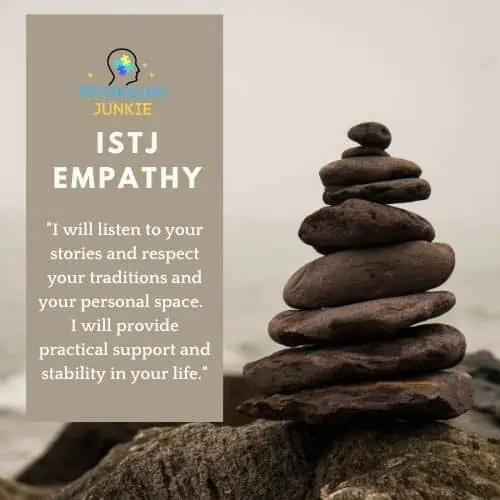
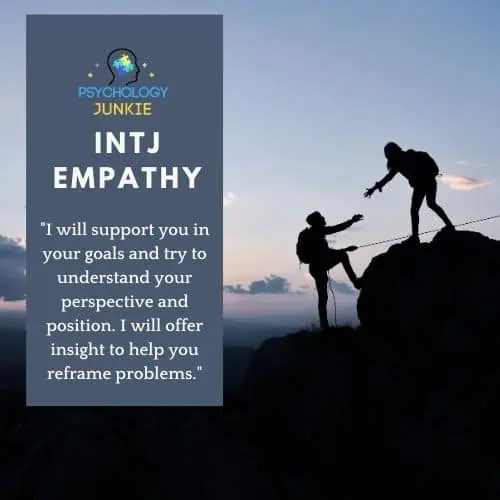
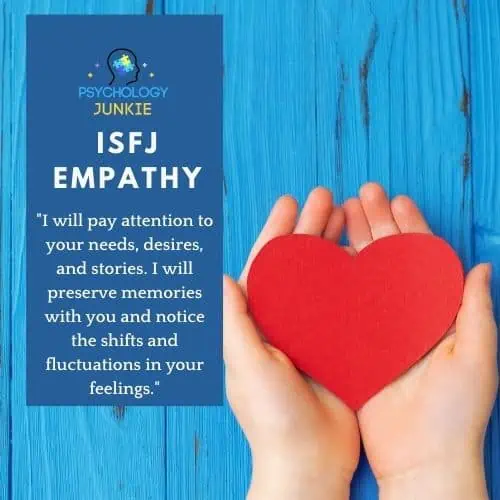
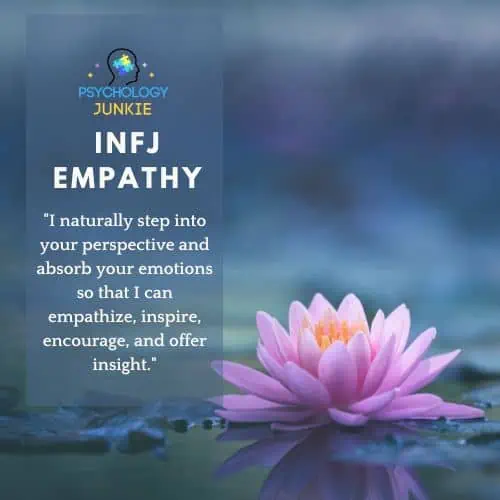
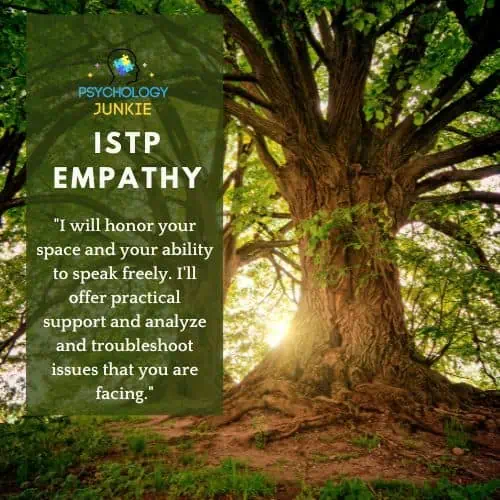
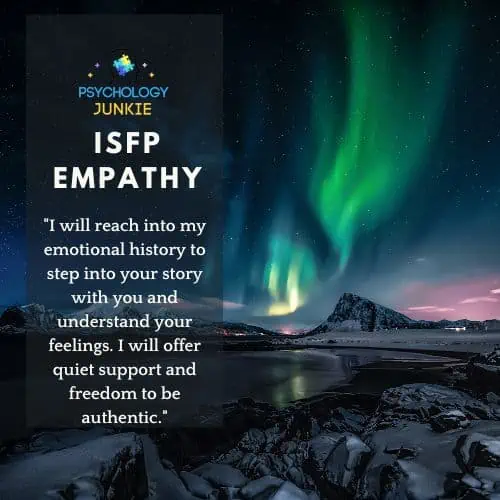
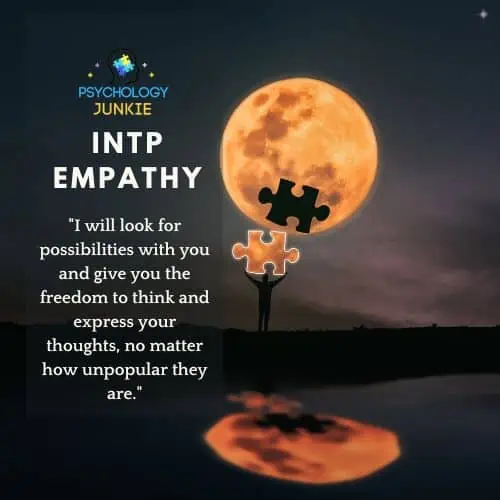
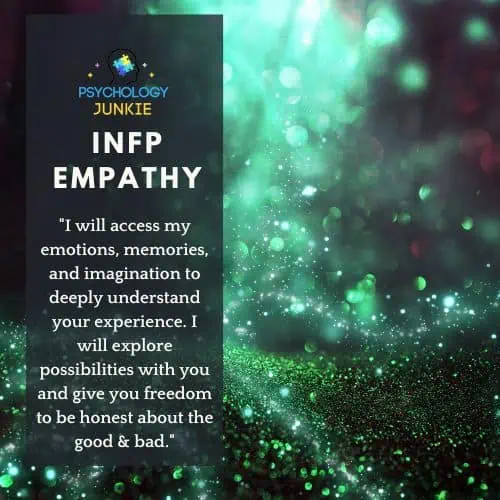

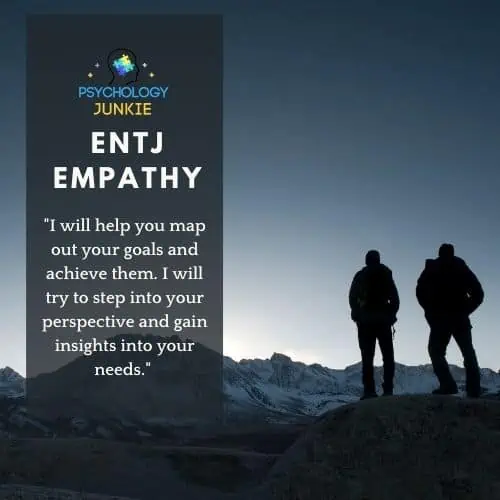
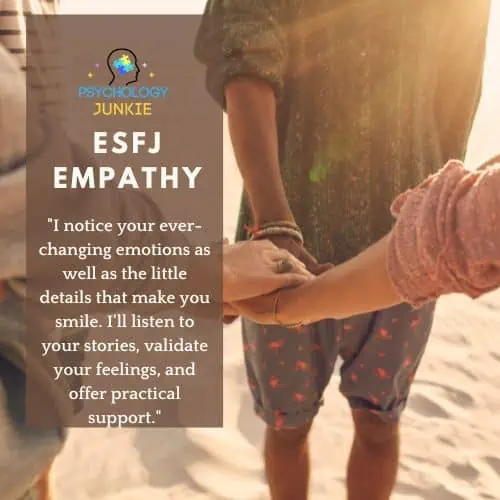
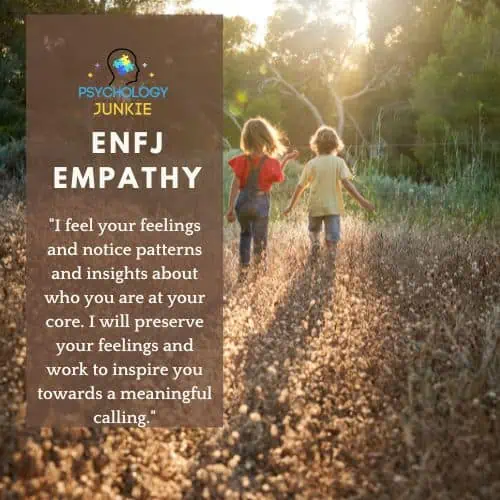
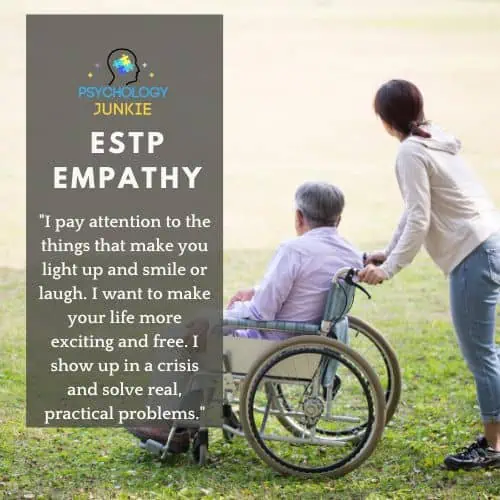

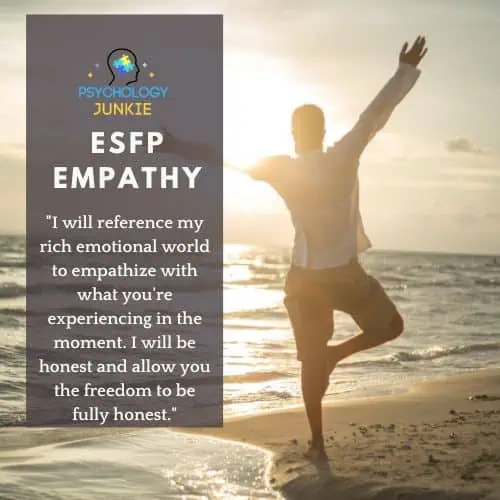
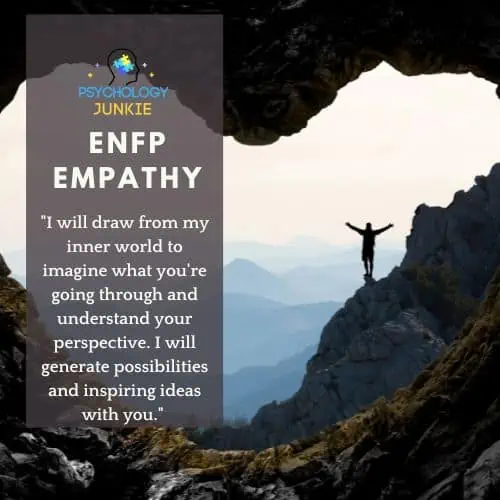




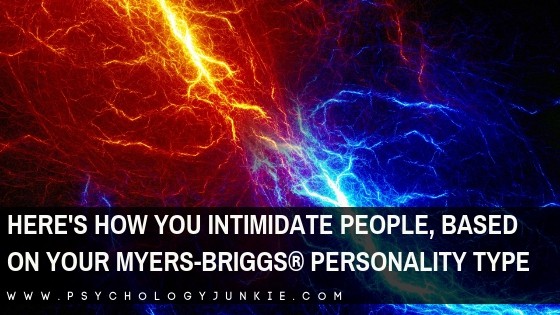


As an ISFP, the way you explained the emotional mirroring is perfection.
Thank’s so much, as always, Susan.
Your ability to see the world from so many perspectives is amazing and admirable. I really appreciate your perspective.
Wish you could do this article using the Enneagram types!
You are so good at what you do, Susan! From one INTJ to another, I always look forward to reading your perspectives in each article and for each type….so many different types to check into with family and friends. Thanks and keep it up.
Great Job, Susan! I have found in my life that there are only 2 personality types that can truely understand an INTJ! they are another INTJ or a INTP if they want to do so.
My problem with “problem-fixers” is not their “logical” approach but their often self-righteously thinking they are more “resilient” or have more “willpower” aka “moral free will”. It is also their assuming all who are stuck (in bad habits, etc.) are deliberately “choosing” to be stuck instead of acknowledging that things of the mind or heart can at least sometimes be uncontrollable.
I’m like an INTJ when it comes to empathy but I’m like an INFJ in my interests.